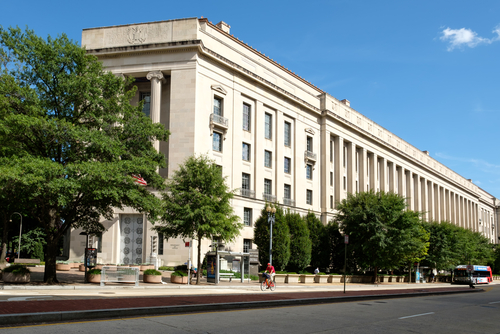Justice Department threatens subpoenas in showdown with sanctuary cities and states

Department of Justice building in Washington, D.C./Kamira (Shutterstock.com).
The U.S. Justice Department on Wednesday demanded documents from 23 sanctuary jurisdictions and threatened subpoenas if they fail to comply.
The letters are intended to find out whether police officers in the jurisdictions are failing to share information with federal immigration authorities, according to a DOJ press release. The Justice Department cites a federal law requiring information sharing, and says jurisdictions that don’t comply aren’t eligible to receive Byrne Justice Assistance Grants.
Jurisdictions receiving letters include the states of Illinois, California and Oregon, as well as the cities of Chicago, New York City and Los Angeles. USA Today, the Washington Post and the New York Times have stories.
The letters asked the jurisdictions to provide “any orders, directives, instructions or guidance to your law enforcement employees.”
The DOJ could withhold the Byrne grants from jurisdictions that violate the information-sharing law, and could seek to claw back fiscal 2016 grants, according to the press release. The 23 jurisdictions received more than $39 million in Byrne grants in fiscal 2016, according to the Post.
Several mayors boycotted a White House meeting Wednesday on infrastructure to protest the Justice Department’s action.
The agency’s efforts to rein in sanctuary cities have been challenged in the courts. A federal judge in San Francisco ruled in November that a presidential order denying funds to sanctuary cities had placed new conditions on the grant of federal funds in violation of the separation of powers, the 10th Amendment’s ban on conscription of local jurisdictions, and the Fifth Amendment’s due process clause.
The judge said Attorney General Jeff Sessions wasn’t credible when he interpreted the executive order narrowly to apply only to federal grants administered by the Justice Department and the Department of Homeland Security.
In September, a federal judge in Chicago said Sessions exceeded his authority when he placed two new restrictions on the Byrne grants. One required cities to give federal agents 48 hours’ notice before people suspected of immigration violations were released from jail. The second said cities had to provide local jail access to immigration agents.



